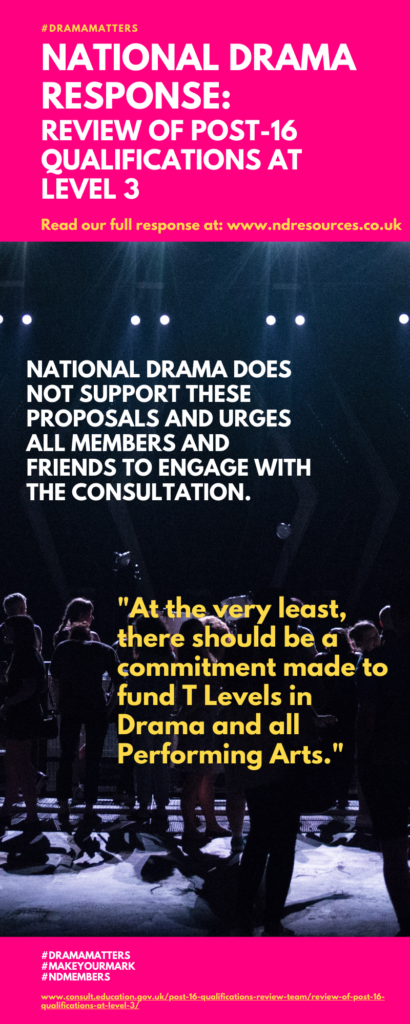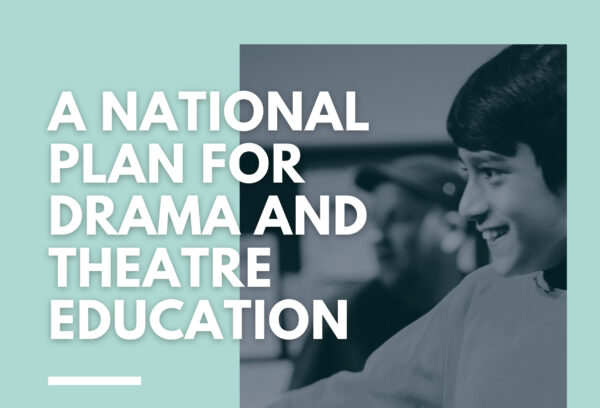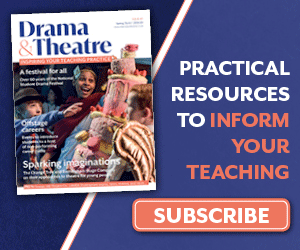Summary
- National Drama does not support these proposals and urges all members and friends to engage with the consultation here
- We believe they create a divide between academic and technical study which is unhelpful for the performing arts industry
- National Drama believes this will limit access, inclusion, and opportunity to all learners but especially disadvantaged and under-represented communities
- National Drama believes the vision of the Drama, Theatre and Young People Manifesto offers a more robust, high quality educational model than the limited paragraph 74 proposal of limited small qualifications
- National Drama believes axing the Performing Arts BTEC with no proposal to create a Drama or Performing Arts T Level is unjust and will damage progression and entry onto degree level courses and into cultural industry careers
- National Drama agrees with the CLA that the government would make a better decision by funding Performing Arts group BTECs and A Levels.

The start of the consultation document has a foreword by Gillian Keegan MP, which seems benign and improving.
“Our education system must equip all students to fulfil their ambition, whatever route they choose. Our further education reforms will mean more students can benefit from a world class technical education. For too long, students have been able to take qualifications that do not give them the skills they need to get the skilled job they want, or progress to further study at a higher level. This cannot continue. It is unfair on students and unhelpful to employers.”
It is only when you see what isn’t written – and a lot is, in dense consultation speak which some might find dry and inhibitive – that it seems none of the questions explicitly state that another outcome will be no T Levels in Drama or Performing Arts.
National Drama have long stated that this administration has not valued the arts, and in fact has implemented policies and values that actively damage the value of drama in schools and universities. We continue to campaign for Drama as a foundation subject, for all at KS 2 and 3, for its canon, its subject specific skills, its heritage and contribution to national life, its contribution to personal development, wellbeing, creative and employment skills. With the Cultural Learning Alliance, and others, we believe that Drama and the arts should be part of the currently limited EBacc. If you have not read the manifesto, please do here Drama, Theatre and Young People Manifesto (dramatheatremanifesto.co.uk). We have also campaigned for bursaries for PGCE and ITT trainees in Drama.
Universities and educators have seen the limitations of the EBacc, but the numbers for GCSEs and BTECs in the arts tell a worrying story of decline, despite tireless work and enthusiasm from our members and friends. There is a clear hierarchy of subjects that this proposal of T and A Levels will reinforce, with the arts subjects firmly at the bottom, and harder than ever to access, especially for those learners without privilege or the private after-school lessons and theatre trips that implies, and from global majority (or in UK terms, ethnic minority) communities, and with SEND/PP.
National Drama agrees with the Cultural Learning Alliance here (Review of Post-16 Qualifications at level 3: Second stage consultation closing Friday 15 January – Cultural Learning Alliance)
“The CLA wants England to have a world class practical and theoretical education system with low value qualifications removed. We believe these proposed reforms risk creating an unhelpful binary pathway between academic and technical routes that does not work for the creative industries, arts and cultural sector, in which many roles require both practical and theoretical knowledge.
We are also concerned that these reforms risk decreasing the number of young people progressing to study creative subjects at degree level, and will have a detrimental impact on the ethnic and economic diversity of the cohorts progressing to university.
The Impact Assessment of the reforms has found students with SEND, people of Asian, African and Caribbean heritage, and students who previously received free school meals (FSM) are more likely to be affected by the proposals. This narrowing of the talent pipeline will limit the ability of our world class creative industries to evolve, continue to grow and to meet the challenges of post-Brexit Britain.”
National Drama also believe that creative BTEC Nationals qualifications and larger three A Level equivalent qualifications should continue to be funded. They provide a valued and robust practical and theoretical qualification, which is more inclusive, more accessible, and supports progression for all. At the very least, there should be a commitment made to fund T Levels in Drama and all Performing Arts.
The government consultation document states that ‘this will mean that all technical qualifications should offer the firm prospect of a sustainable job and career,’ which underlines a misunderstanding of what KS5 qualifications in the arts offer as academic, artistic, practical, technical, collaborative, and culturally important subjects. BTEC is holistic and accessible: introducing pathways for potential designers, administrators, arts development staff, youth workers, directors, engagement and participation leads, technicians, marketing and communications officers, producers, writers, customer service staff and performers.
The DfE is also proposing to fund a small range of academic qualifications that should be taken alongside A Levels, including ‘small qualifications in performing or creative arts’, which will need to be ‘valued’ by specialist Higher Education institutions. National Drama sees some hope in page 30s paragraph 74 here. However, there is a concern (see footnote 21 on the same page) that these will replicate music instrumental and singing grades 6 – 8, which reflects an elitist and regressive step. BTEC and A Levels give learners crucial opportunities to be makers, as well as being informed by the canon and new material, producers, collaborators, and critics. Music grades are wonderful, and well respected, for what they are. What BTEC and A Levels do that this model does not is enable access to the established canon, and more representative work, by women, artists who are working today, Black, Asian and differently abled artists and practitioners, from Shakespeare to Wertenbaker, Talawa to Pilot, Evan Placey to Brecht, Splendid Theatre to Frantic Assembly to Graeae Theatre. There is making, devising, process and reference to the living breathing working contemporary arts industry.
National Drama encourages everyone to take part in the consultation and make their mark.





1 thought on “National Drama Response: Review of Post-16 Qualifications at Level 3”
This perceptive, insightful and informed response reflects why ND is such an influential association; one that is going from strength to strength in these dire times for our subject.
Comments are closed.